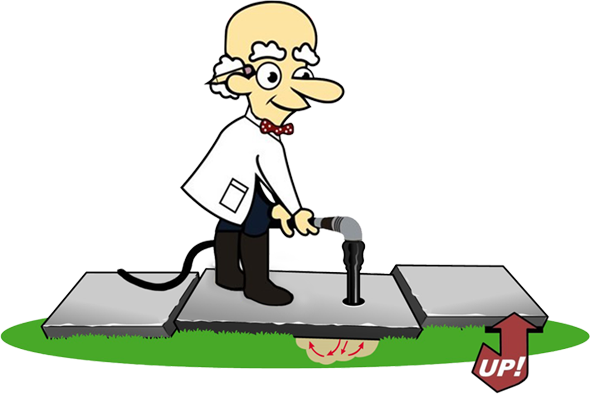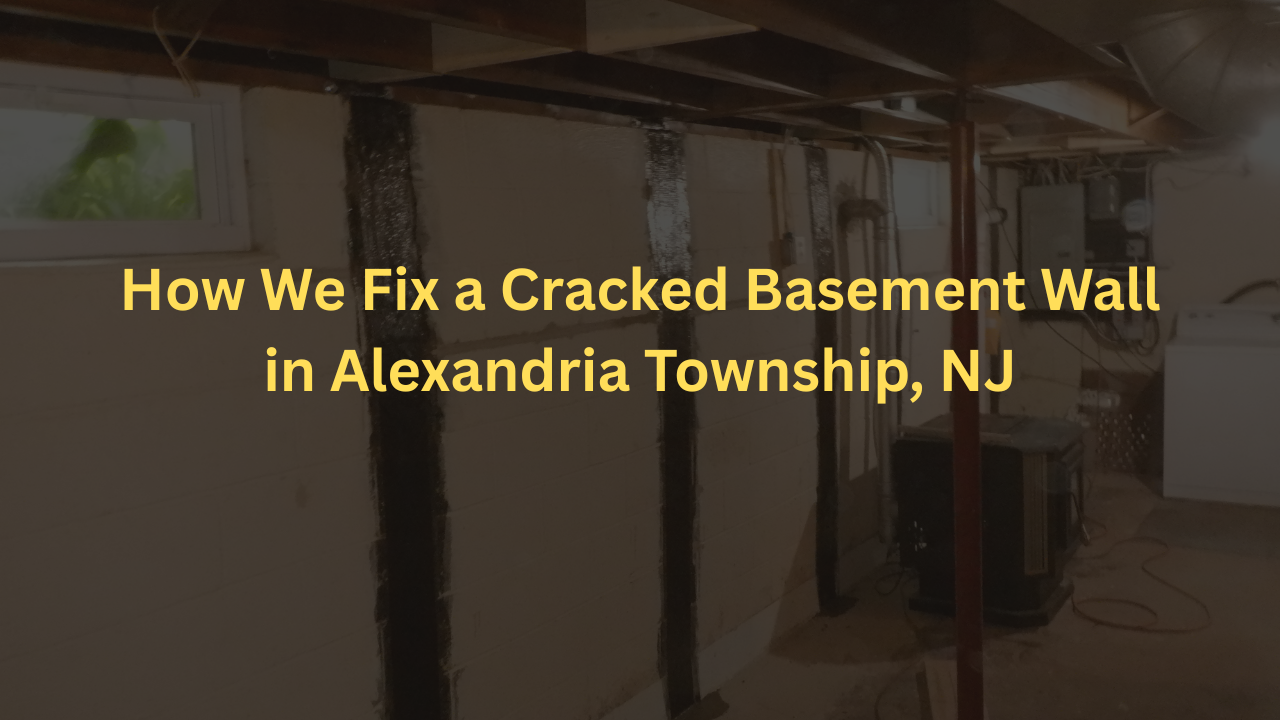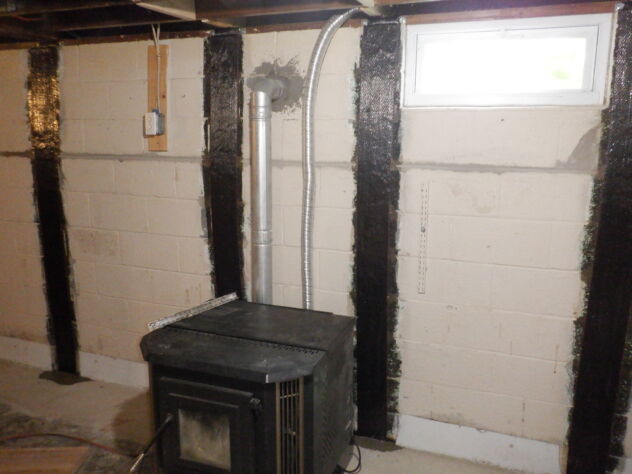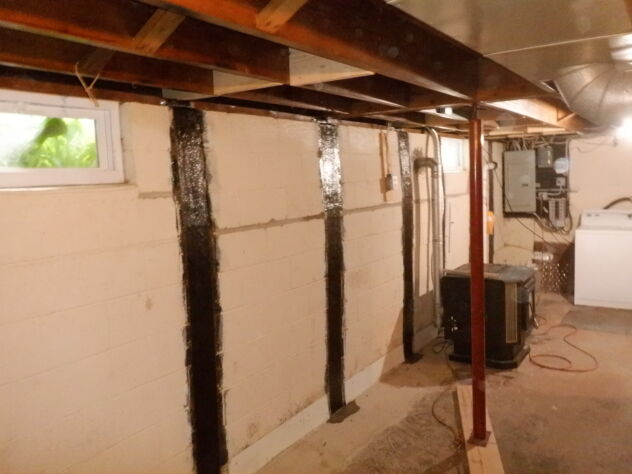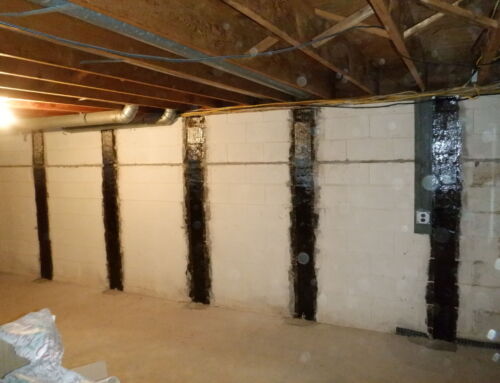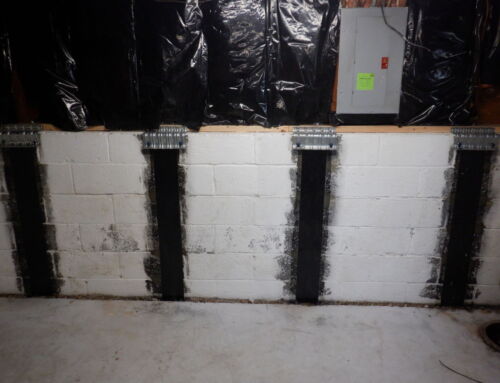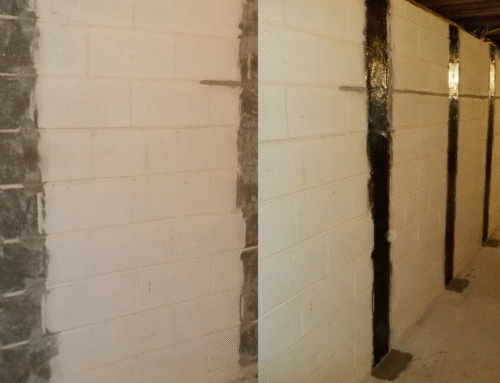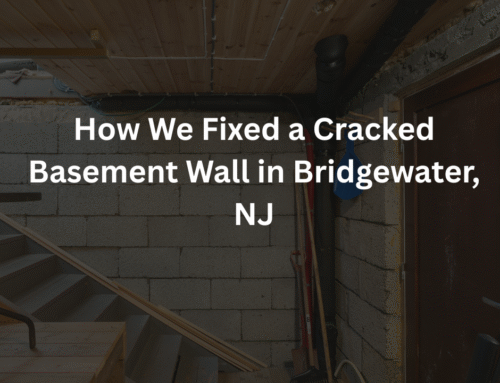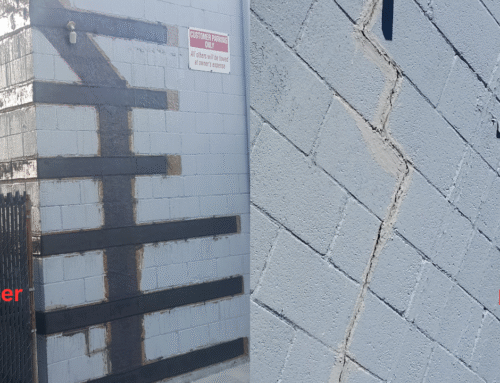IN THIS ARTICLE
Discover how We Repaired a Cracked Basement Wall in Alexandria Township, New Jersey
Cracked or bowing basement walls are not something any homeowner wants to see, especially when winter is around the corner. In Alexandria Township, NJ, we’ve noticed more foundation issues show up as the ground freezes and thaws. The reason is simple — moisture in the soil expands when it freezes, and that pressure pushes against the foundation walls. Over time, the pressure can cause cracks, bowing, or even water seepage.
At Concrete Chiropractor, we’ve repaired many basement walls in the Alexandria area using a clean, non-invasive, and permanent method: carbon fiber wall straps. This article explains how we identify the problem, how one homeowner found us, and how the repair process works from start to finish.
How Winter Impacts Foundations in Alexandria Township
Alexandria Township and the surrounding Hunterdon County area have a mix of clay and loamy soils. These soils hold moisture easily. When that moisture freezes, it expands, creating what’s known as hydrostatic pressure. This pressure pushes against the foundation from the outside. During heavy rain or snowmelt, that pressure increases even more.
If you’ve ever noticed small horizontal cracks near the middle of your basement wall or stair-step cracks along the block joints, those are signs of stress. Left alone, these cracks can widen. Eventually, the wall might start to lean inward, and water might begin to seep through. That’s when homeowners realize they need a professional to step in.
Why Basement Walls Crack or Bow
There are a few common reasons basement walls crack or bow:
- Hydrostatic Pressure: This is the most common cause. When the ground around your home becomes saturated after rain or snow, the soil expands and puts force on the wall. Concrete can only handle so much before it gives way.
- Poor Drainage: Clogged gutters, downspouts that don’t extend far enough, or improper grading can cause water to pool around the foundation.
- Frost Heave: When water in the soil freezes, it expands and pushes against the wall, particularly in colder months.
- Expansive Clay Soil: Parts of New Jersey have clay-heavy soil that expands when wet and contracts when dry, constantly stressing the foundation.
- Tree Roots or Construction Nearby: Large roots or nearby digging can disturb the soil and shift pressure toward your walls.
Whatever the cause, the signs are easy to recognize: visible cracks, bowing, leaning, or damp patches in the basement. When we see these symptoms, it’s time to assess the damage and decide on the best repair approach.
How the Client Found Us
The homeowner in Alexandria Township came across Concrete Chiropractor while searching online for “cracked basement wall repair in New Jersey”, “foundation repair near me,” and “carbon fiber wall straps NJ.” After reading about our experience with carbon fiber technology, they reached out for a free consultation.
When a new client calls us, we first ask them to send clear photos of the affected wall. This helps us get an initial understanding of the issue before we visit. From those photos, we can often identify the type of crack, whether the wall is bowing, and whether carbon fiber straps are a suitable fix. We then provide a free estimate based on our evaluation. This step saves time and gives homeowners a fair idea of what’s involved — no obligation, just useful information.
Once the client in Alexandria Township reviewed our recommendation, they agreed to proceed with the repair. We scheduled a day for the full installation, which typically takes less than one working day.
Our Proven Carbon Fiber Wall Repair Process
Carbon fiber is an incredibly strong material — lighter than steel but several times stronger in tension. It’s used in aerospace and automotive industries for its strength-to-weight ratio. When applied correctly to a concrete or block wall, it prevents further inward movement and restores stability.
Here’s how we perform the repair step-by-step:
- Inspection and Assessment
Before starting, we measure the wall’s deflection — how far it has bowed inward. If the bowing is less than two inches, carbon fiber is usually the right solution. For more severe cases, other reinforcement methods like wall anchors might be needed. We also identify what caused the damage, whether it’s drainage issues, frost pressure, or soil expansion. - Surface Preparation
We grind the wall surface where the straps will be applied. This removes paint, dust, or efflorescence and exposes clean concrete. A clean surface ensures proper bonding between the wall and the epoxy. - Crack Sealing
If there are any visible cracks, we fill them with a hydraulic cement or epoxy filler. This strengthens the wall and prevents moisture from entering later. - Applying Epoxy
We apply a high-strength structural epoxy resin to the prepared sections of the wall. This resin is what bonds the carbon fiber to the concrete. - Installing the Carbon Fiber Straps
The carbon fiber straps are applied vertically from the base of the wall up to the sill plate. We press them firmly into the epoxy to make sure there’s full contact along the surface. - Final Epoxy Coating
We apply one final coat of epoxy over each strap. Once it cures, it forms a smooth, durable surface that can easily be painted over if you plan to finish your basement later.
This process doesn’t require excavation, so your landscaping and yard remain untouched. There’s no mess, no large equipment, and no disruption to your home.
Why Carbon Fiber Straps Are the Best Choice for Bowing Basement Walls
Carbon fiber straps are a modern alternative to older, more invasive methods like steel I-beams or exterior excavation. Here’s why we prefer them:
- Non-invasive: All work is done inside your basement.
- Stronger than steel: Carbon fiber resists tension forces far better.
- Quick installation: Most projects are completed in one day.
- Permanent reinforcement: Once installed and cured, it stops any further wall movement.
- Low-profile finish: The straps sit nearly flat against the wall and can be painted over.
- Long-term stability: They maintain strength through temperature changes and humidity.
For homeowners in Alexandria Township dealing with foundation stress caused by seasonal changes, this is one of the most reliable long-term fixes.
Real Repair Results
The homeowner we mentioned earlier had a block wall that had bowed slightly more than an inch inward. It also had a horizontal crack running along the center. After completing the carbon fiber installation, we restored full stability to the wall. Once the epoxy cured, the basement looked clean again, and the homeowner was able to paint over the repaired area.
We’ve done several similar projects throughout Alexandria Township and neighboring towns. Most homeowners tell us the same thing afterward — they wish they had called sooner. Fixing the issue early stops the wall from getting worse.
When to Call Concrete Chiropractor
If you see cracks forming on your basement walls, the best time to act is now. Here are a few signs that it’s time to reach out:
- Horizontal cracks along the middle of the wall.
- Stair-step cracks between concrete blocks.
- Walls bowing inward or showing a slight curve.
- Water stains, dampness, or musty smells in the basement.
- Uneven or shifting basement floors.
These signs indicate that pressure is building behind your foundation. The earlier we inspect it, the easier and more affordable it is to correct. Our inspections are professional, straightforward, and backed by structural expertise. We also make sure that all work complies with local building requirements and engineer standards.
Even if you’re not ready to schedule a repair, sending us a few photos can help you understand what’s happening. Sometimes it’s a minor issue; other times it needs prompt attention. Either way, knowing what you’re dealing with is better than guessing.
Final Thoughts
Winter can be tough on foundations, but problems like cracked or bowing basement walls don’t have to become emergencies. With modern materials like carbon fiber, you can stop further damage without heavy equipment or costly excavation.
If you live in Alexandria Township or anywhere in New Jersey, and you’ve noticed cracks or bowing in your basement wall, we encourage you to reach out. We’ll review your photos, provide a free estimate, and explain the best way forward. No sales pitch — just clear information to help you protect your home.
At Concrete Chiropractor, we’ve been repairing foundations across New Jersey for years. Our goal is simple: keep your home stable, safe, and dry through every season. Our process is quick, clean, and based on over 25 years of experience repairing concrete walls and floors across New Jersey and Eastern Pennsylvania.
- How We Raised a Sunken Concrete Walkway in Sewell, NJ - November 20, 2025
- Carbon Fiber Foundation Repair: All You Need to Know - November 20, 2025
- 5 Common Causes of Concrete Porch Collapse (and How to Prevent It) - November 20, 2025

